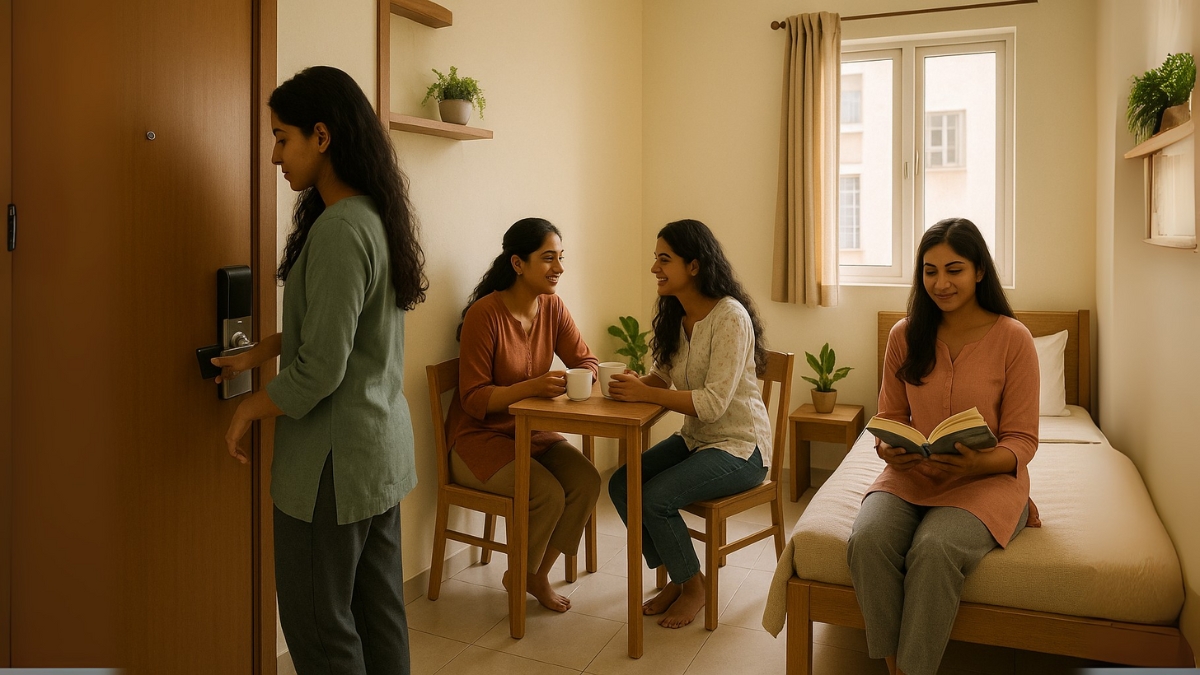Emerging Trends in Women’s Hostels in South India: A Blend of Safety, Community & Comfort
In the last several years, the way we think about women’s hostels in South India has quietly but significantly shifted. What used to be fairly basic accommodations, mostly seen as temporary shelters for students and job seekers, have gradually turned into spaces that offer something more: not just safety and affordability, but a genuine sense of comfort and community.
Especially in cities like Coimbatore, Chennai, Bengaluru, and Hyderabad, women are seeking more than just a place to stay. They’re looking for an environment where they feel secure, supported, and part of something, and hostels are beginning to reflect that.
Safety First — and Always
Let’s face it: safety is non-negotiable. Especially for women living away from home, peace of mind matters just as much as clean rooms or good food. And in many of today’s hostels, security is no longer a checkbox; it’s baked into every detail.
Biometric entry points are becoming common. So is around-the-clock surveillance. Some hostels even keep visitor logs and use OTP-based systems for guests. And then there are those thoughtful extras, female-only staff, on-site wardens, and panic buttons in rooms, which go a long way in building trust with residents and their families.
It’s not about flashy tech. It’s about making women feel safe when they lock the door at night, and that’s something families notice when choosing where to send their daughters.
A Place to Live, Not Just Sleep
There’s a big difference between a bed and a home. And more hostels today are trying to create the latter.
It’s subtle things, like open lounges with books and board games, or weekend movie nights where strangers slowly become friends. Some hostels organize yoga classes or celebrate festivals together. Others host small workshops, nothing fancy, just opportunities to connect.
This might seem like a bonus, but for many residents, especially those new to the city, these spaces become their emotional anchor. They offer companionship without pressure and a rhythm that softens the feeling of being away from family.
Comfort Without Breaking the Bank
Affordability has always been a strength of hostels, but the difference now is that affordable doesn’t mean “bare minimum.”
Walk into a well-run women’s hostel today and you’ll likely find clean, furnished rooms, decent Wi-Fi, proper ventilation, and even services like laundry and housekeeping. Some offer multiple food options, simple, nutritious, and tailored for different dietary needs.
And payment options are more flexible too, monthly, quarterly, or even discounts for longer commitments. Whether you’re a college student budgeting every rupee or a young professional saving for the future, it’s possible to find something that fits without feeling like a compromise.
A Growing Awareness of Sustainability
Interestingly, some hostels are also taking small but real steps toward sustainability. Maybe it’s solar panels on the roof, or composting kitchen waste. Maybe it’s as simple as reusing grey water for plants or ditching plastic cutlery.
Some of these choices are driven by cost, others by conscience, but either way, they’re part of a slow, thoughtful shift in how these spaces are managed. And residents, especially younger ones, do notice.
Who’s Living in Hostels Today?
It’s not just college kids anymore. There’s a broader range of women choosing hostels now: healthcare workers, IT professionals, online freelancers, even civil service aspirants. Many of them aren’t just looking for a temporary setup; they want somewhere that supports their routines and respects their independence.
And as remote work becomes more common, there’s more demand for quiet corners, stable internet, and a bit of personal space, even in shared living environments.
Where This Is Happening
While this change is happening across the board, some cities have become real hotspots. Coimbatore, for example, has seen a clear rise in professionally run, women-only hostels that offer modern amenities. Places like Peelamedu and Gandhipuram are not just central, they’re also well-connected, relatively safe, and close to educational institutions and tech parks.
Chennai and Bengaluru are seeing similar patterns, particularly in neighborhoods like Velachery, Koramangala, and HSR Layout.
A Glimpse of What’s Next
Looking ahead, the lines between hostel, PG, and co-living space are starting to blur. Some women’s hostels now offer short-term stays for business travelers or private rooms for out-of-town relatives visiting residents.
A few are even partnering with colleges or companies to reserve floors or buildings for interns and staff. The goal seems to be flexibility, making sure the space adapts to people’s changing needs, rather than the other way around.
Final Thoughts
At the heart of it all, women’s hostels in South India are quietly becoming something new. They’re no longer just a stopgap. For many women, students, professionals, and dreamers, they’re becoming the place where real life happens: full of early mornings, long chats, shared meals, quiet corners, and small wins.
And maybe that’s what matters most. Not just where you stay, but how you live while you’re there.


Comments are closed